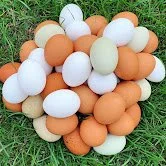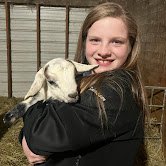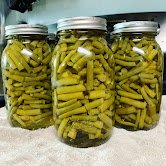An Egg-cellent venture
Alison Nyberg’s flock of chickens is colorful and diverse. And so are the eggs those hens produce.
Open a carton of the eggs and you are greeted with a cornucopia of color. There are the common white eggs everyone associates with as well as brown colored eggs, but then there’s a fun surprise of olive and some speckled ones.
Those wonderful colors are made by the variety of breeds she raises. There are White Leghorns, ISA Browns, Rhode Island Reds, Dominiques, Midnight Majesty Marans and Olive Eggers.
“We get new chicks every February or March for the kids to show at the county fair as 4-H projects and we always add in a few extra breeds just for fun!” She said.
Thanks to those 4-H projects, Alison and her partner, Tom Schiesser, have added to their farming venture.
Tom runs a grain farm raising mostly corn and soybeans, she said. The couple, who’ve been together for 17 years, and their four children - Emma, 12; Elise, 9 and five-year-old twins, Wyatt and Vera - also tend to dairy breed goats, mostly Alpine, and the chickens.
The goats started as a 4-H project that’s turned into a fun hobby and a life lesson and responsibility teacher for the kids.
“From the sad days of losing an animal to the miracle of watching life enter the world - we are so blessed to be raising kids on the farm,” she said.
Each summer, when the chicks begin to lay, they sell “a chunk” of their adult laying hens.
“We have not dabbled in butchering ourselves, although I really would like to learn some day,” she added. “Our chickens never seem to completely stop laying in the cold winter months, but they do slow down and we do lose a lot of eggs to the bitter cold at times. We eat a lot of eggs during the warm summer months, especially when our hens lay like crazy!”
She has several customers Alison sells to on a weekly basis.
“We never seem to have a hard time selling any extra eggs,” she said.
The chickens eat chicken feed they purchase from the local feed mill and they always have free choice oyster shells. The oyster shells provide calcium which helps the chickens’ bone structure and gives the eggs a hard shell.
“They also get plenty of scraps from our kitchen,” she said. “Chickens will eat just about anything. We occasionally feed them mealworms as a treat and they love a fresh nightcrawler.”
Here’s a factoid offered by Alison: Did you know it takes 24-26 hours for a hen to create each egg? Most chickens can lay an egg a day during their peak laying months.
But what’s so great about farm fresh eggs?
I, Carol, would like to answer that one.
My brother, Byron, raised laying hens for several years and was known as the “egg man” delivering eggs to the Farmers Market in Elbow Lake throughout the year - even in winter!
When he was starting his flock, he gave me a couple dozen eggs which my own family thoroughly enjoyed.
One day, when my eldest was making himself a meal (Wayne was a teenager and I swear he had hollow legs), he took some of the eggs to make eggs and toast.
I was reading in the living room when I heard him crack an egg into his hot pan and heard to call to me.
“Mom,” he said. “Is there something wrong with this egg?”
I went in the kitchen to look at the eggs that were now frying and I smiled.
“No,” I answered. “That’s the way an egg SHOULD look.”
The eggs held their shape. He was accustomed to eggs we had purchased in the store which usually have whites that spread out in the pan.
Farm fresh eggs are as the name implies - they are fresh. Store purchased eggs are older merely because of travel distance and being on the shelf.
Gardening, too
Alison and family tend to a large garden every year. She does plenty of canning and freezing every year which is fun for the kids as the y help her and learn the canning process. Emma canned pickles last year for a 4-H project and, at the fair, earned a purple champion ribbon.
The kids love to give pickles and homemade jelly to their teachers she said.
An Active Family
They certainly aren’t an idle family in winter. All four kids ice skate. The two oldest compete in several skating competitions during the season, she said.
“We definitely love the skating season, but are very much looking forward to warm days so we can be outside all day,” Alison said.
Eggs from their farm were used in our Locally Grown Meal where Chef Leon prepared Eggs Benedict.










